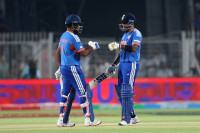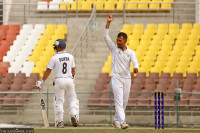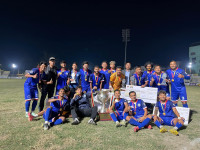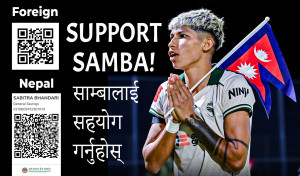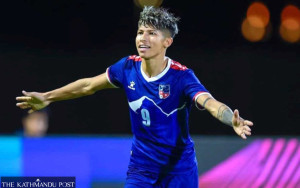Sports
Caught out or not out?
Two years ago, a 30-year-old cricket enthusiast, Ravi Khanal, from Attariya, the country’s Farwest, pondered over promoting women’s cricket by introducing a franchise-based league.
Adarsha Dhakal
Two years ago, a 30-year-old cricket enthusiast, Ravi Khanal, from Attariya, the country’s Farwest, pondered over promoting women’s cricket by introducing a franchise-based league. It was a daring act spurred on by the clamour that the national men’s franchise cricket had made.
They may be behind the money-spinning global competitions, but tournaments like Everest Premier League (EPL), Dhangadhi Premier League (DPL) and Pokhara Premier League (PPL) have played a pivotal role in Nepali cricket’s professional leap. With growing interest across the country, the Twenty20 leagues have been able to lure more sponsors, prompting cricket enthusiasts to find ways to help boost the sport as a whole.
But Khanal, unlike other cricket enthusiasts, decided to swing against the wind—and promote cricket by initially planning a league entirely for women.
Little support
Khanal, who was the president of United Attariya Sports Club at the time, had to live the toughest four months of his life to materialise his plans.
“With all the buzz created by the franchise leagues, its players’ auction and the massive attention it was generating, I thought carrying out a similar trend would be quite easy,” Khanal told the Post in a phone interview from his shop in Attariya. “On the contrary, I spent two months banging on the doors of sponsors. Corporate houses were visibly hesitant to invest in women’s cricket.”
After settling on a nominal sponsor amount in the end, Khanal said he had to postpone the event before hosting a six-team event in the summer of 2017 in his hometown.
Cricket is just a reflection of how women’s sports have been cornered in Nepal.
Play for Deprived Children Nepal (PDCN)—a non-government organisation—organised Nepal’s first-ever ‘home and away’ basketball league for men last year. In the absence of a proper competition platform, the league served as a boon for a game that has seen a drain of hoopsters in large numbers since the country made its foray into the international arena in 2001.
Last year, the PDCN had announced that it would introduce women’s league, but is still struggling to get started because of a lack of sponsors. “When we approach sponsors, they tell us that they aren’t interested in being associated with women’s sports because it doesn’t generate enough mileage. I feel disillusioned with this response because men’s and women’s sports are equally competitive,” said Arun
Karki, president of the PDCN.
“There’s good scope and enthusiasm for women’s basketball in this region but sponsors believe that such competitions don’t garner much interest,” says Karki. “If you take the cost of organising a match, you’ll not find much difference between women’s and men’s matches. But we face the biggest hurdle when sponsors don’t show any interest in supporting women’s sports.”
Gender disparity
Khanal and the PDCN are private entities who are not entitled to or responsible for promoting and developing sports in the country. However, their efforts play a big part in the welfare of the sports fraternity, considering the largely passive roles of most of the sports associations. Most of these associations depend on petty grants provided by the National Sports Council (NSC), the sports governing body of Nepal, to run their programmes.
However, even the sports associations that draw hefty grants through international bodies have been unable to give equal treatment to men’s and women’s sports.
Exhibit A—the All Nepal Football Association (ANFA), which is set to receive at least $1.2 million from the Asian Football Association for a period of four years starting 2019, this football season offered Rs5 million to the men’s league champions Manang Marshyangdi Club, while women’s league champions Nepal Armed Police Force Club received only Rs200,000 last year. The women’s league was organised by the NSC as ANFA was embroiled in a power-tussle over the holding of the league at the time.
Such disparity, however, is not exclusive to Nepal.

A file photo shows Anita Basnet in action during the Hero Women’s Cup match against Iran in Bhubaneswar, India. PHOTO COURTESY: ANFA
Sports worldwide is weighed down with such discrepancies when it comes to gender equality. A report published by the ‘Sporting Intelligence’ annual salary survey shows that Brazilian superstar, Neymar, earned £32.9 million alone from his contract with French Ligue 1 outfit Paris St Germain for 2017-18 season. His pay cheque was equal to what 1,693 female footballers in France, Germany, England, the United States, Sweden, Australia and Mexico collectively earned.
Nepali cricket fans’ latest shoutout went to the Australian Big Bash League where the country’s wonderkid, Sandeep Lamichhane, gave impressive performances to earn himself a regular berth at the Melbourne Star’s playing XI. Nepali cricket fans tend to follow the Big Bash League even if Lamichhane doesn’t feature in that league.
Conspicuously, Cricket Australia is hosting the Women’s Big Bash League almost simultaneously but hasn’t been able to occasion much attention considering the media coverage, or lack thereof, not just in Nepal but globally.
the last leg
Former national team skipper Binod Das recently guided the Nepal women’s cricket team to the final of an international tournament. The team made it to the Thailand Women’s Twenty20 Smash title showdown on January 20. This was Nepali women cricket team’s first international event after 13 years. For over four years, women’s cricket remained in the shadows in the absence of domestic tournaments.
Das sees a huge potential in the current women’s cricket team which played in the finals against a team from Thailand that has vast international exposure having already featured in the ICC World Twenty20 in the Netherlands. Das believes that the way out of this quagmire for Nepal is a franchise league, and he has ideas to tackle the ‘no-sponsor’ concern too. “The sponsors seek mileage and noise, and with everyone’s support, including that of the media, it is definitely possible to organise such a league,” said Das, who is also the coach of U-19 team.
Nepal’s women’s team skipper Rubina Chhetri wants the government to intervene to end this disparity.
She said, “Men’s cricket is flourishing and is achieving milestones because of the hard work put in by the players. They have produced results and that is the reason why they have franchise leagues.
“On the contrary, our women’s team have no results to show. The government needs to invest heavily in women’s sports to not only uplift the state of women’s sports but also to ensure that Nepali women do not quit sports altogether,” said Chhetri, who fears that this generation could very well be the last of Nepali women in cricket.
“It’s quite saddening to see the plight of women’s cricket but if we don’t keep playing, we can’t inspire the upcoming generation to continue down this road. I take it as a challenge and march on because if we stop now, we could be the last ones carrying the baton for Nepali women’s cricket,” she said.
Much to the delight of Chhetri, two private entities appeared last week announcing franchise leagues for women cricketers. But Chhetri feels that there is a long list of work that Nepal needs to do as a sporting country. “These leagues spur the sport forward and is the reason why we need to keep playing. But there is a huge amount of work that has to be done before we start celebrating, from reworking the salary scale for national women cricketers to organising more tournaments like these,” she added.




 9.89°C Kathmandu
9.89°C Kathmandu
